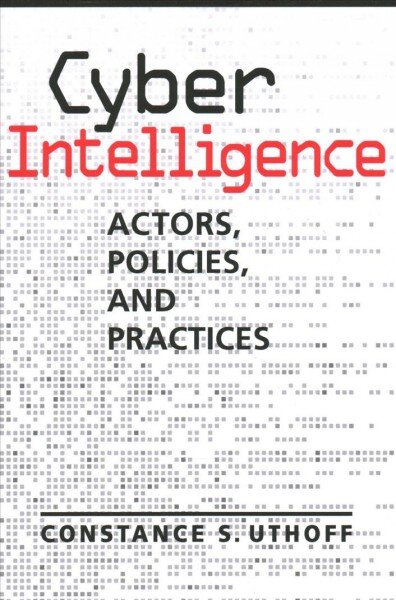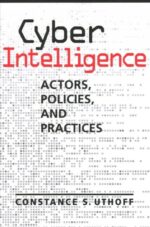„A comprehensive overview of cyber intelligence, explaining what it is, why it is needed, who is doing it, and how it is done”–
„A valuable contribution…. Providing many detailed examples of cyber attacks aimed at the public and private sectors, Uthoff both documents and explains the various US policies and doctrines related to cyber intelligence and cyber threats from the 1990s to the present.” —John D. Woodward, Jr., Boston UniversityUS national security compromised by Wikileaks. Towns held hostage by ransomware. Corporate websites hacked. Cyber espionage and cybercrimes are increasing in both frequency and sophistication—requiring the collection of actionable intelligence in order to combat them. Constance Uthoff provides a comprehensive overview of cyber intelligence, explaining what it is, why it is needed, who is doing it, and how it is done.Notably, Cyber Intelligence:• Outlines the roles of the major US intelligence agencies involved.• Assesses significant laws and policies from the 1990s to the present.• Compares methods and best practices across the public and private sectors.• Looks beyond the US to explore the capabilities of actors like China, Iran, and Russia.• Includes real-world examples and case studies.The result is an in-depth examination of the processes and applications of spying in cyberspace, accessible to a wide range of readers. CONTENTS:The Cyber Domain.The Threat Landscape.The Cyber Intelligence Cycle and Process.National Security Strategies and Policies.The Office of the Director of National Intelligence.The National Security Agency.The Central Intelligence Agency.The Federal Bureau of Investigation.Intelligence Sharing.Counterintelligence Efforts.Cyber Operations in International Conflicts.Cyber Threats and Nonstate Actors.Emerging Cybersecurity Challenges.Three Case Studies of Cyber Espionage.The Future of Cyber Intelligence.
„A valuable contribution…. Providing many detailed examples of cyber attacks aimed at the public and private sectors, Uthoff both documents and explains the various US policies and doctrines related to cyber intelligence and cyber threats from the 1990s to the present.” —John D. Woodward, Jr., Boston UniversityUS national security compromised by Wikileaks. Towns held hostage by ransomware. Corporate websites hacked. Cyber espionage and cybercrimes are increasing in both frequency and sophistication—requiring the collection of actionable intelligence in order to combat them. Constance Uthoff provides a comprehensive overview of cyber intelligence, explaining what it is, why it is needed, who is doing it, and how it is done.Notably, Cyber Intelligence:• Outlines the roles of the major US intelligence agencies involved.• Assesses significant laws and policies from the 1990s to the present.• Compares methods and best practices across the public and private sectors.• Looks beyond the US to explore the capabilities of actors like China, Iran, and Russia.• Includes real-world examples and case studies.The result is an in-depth examination of the processes and applications of spying in cyberspace, accessible to a wide range of readers. CONTENTS:The Cyber Domain.The Threat Landscape.The Cyber Intelligence Cycle and Process.National Security Strategies and Policies.The Office of the Director of National Intelligence.The National Security Agency.The Central Intelligence Agency.The Federal Bureau of Investigation.Intelligence Sharing.Counterintelligence Efforts.Cyber Operations in International Conflicts.Cyber Threats and Nonstate Actors.Emerging Cybersecurity Challenges.Three Case Studies of Cyber Espionage.The Future of Cyber Intelligence.
Daugiau prekių iš šios kategorijos
- Definition and Importance of Cyber Intelligence: Cyber intelligence involves collecting actionable information to combat increasing cyber threats such as cyber espionage, ransomware, and hacking, making it essential for national security and private sector protection.
What is cyber intelligence and why is it important?
Cyber intelligence involves gathering actionable information to effectively counteract rising cyber threats such as cyber espionage, ransomware, and hacking, making it crucial for safeguarding national security and private sector interests.








